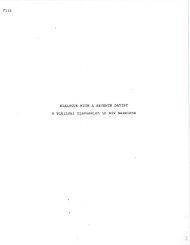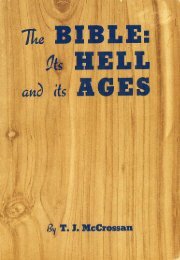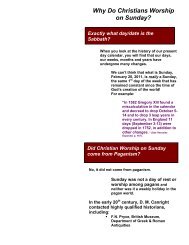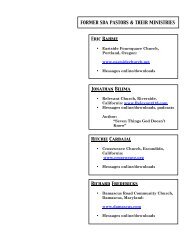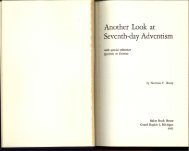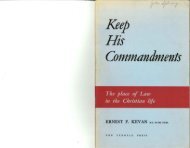Discovering the New Covenant by Greg Taylor - exAdventist Outreach
Discovering the New Covenant by Greg Taylor - exAdventist Outreach
Discovering the New Covenant by Greg Taylor - exAdventist Outreach
You also want an ePaper? Increase the reach of your titles
YUMPU automatically turns print PDFs into web optimized ePapers that Google loves.
DISCOVERING THE NEW COVENANT<br />
<strong>the</strong>y be required in <strong>the</strong> next life? Should <strong>the</strong>y be kept<br />
today? Are <strong>the</strong>y still binding? Then I noticed that <strong>the</strong> next<br />
couple of verses speak about <strong>the</strong> inhabitants walking<br />
around and encountering <strong>the</strong> dead bodies of those who have<br />
rebelled against <strong>the</strong> Lord. That didn’t sound like <strong>the</strong> new<br />
earth as described in Revelation. In reading <strong>the</strong> larger<br />
context of <strong>the</strong> same vision, I found “for <strong>the</strong> child will die<br />
one hundred years old.” (Isaiah 65:20) What a strange<br />
picture of heaven--dead bodies of <strong>the</strong> enemies of God<br />
encountered as one walks around <strong>the</strong> city, and people dying<br />
after 100 years or so! The reason it sounds so strange is<br />
because <strong>the</strong> “new heavens and new earth” that Isaiah is<br />
talking about is not <strong>the</strong> new earth of Revelation where<br />
“<strong>the</strong>re will be no more death or sorrow or crying.” Instead,<br />
it is describing Isaiah’s picture of what <strong>the</strong> earth would<br />
have been like if Israel had accepted <strong>the</strong> Messiah and<br />
become <strong>the</strong> center attraction of <strong>the</strong> world. People would<br />
have come to Israel to see what <strong>the</strong>ir God had done. They<br />
would have joined Israel in worship and God’s blessings<br />
would have made this earthly “<strong>New</strong> Jerusalem” <strong>the</strong> center<br />
of <strong>the</strong> world. This prediction was one of those prophecies<br />
that was conditional on <strong>the</strong> acceptance of <strong>the</strong> Messiah.<br />
Since Israel rejected <strong>the</strong> Messiah, it was not fulfilled.<br />
Ano<strong>the</strong>r sticking question for Adventists is Jesus’<br />
statement telling his disciples to pray that <strong>the</strong>ir "flight may<br />
not be in <strong>the</strong> winter or on <strong>the</strong> Sabbath" (Mt 24:20). Doesn't<br />
this indicate that <strong>the</strong> Sabbath is still to be binding in <strong>the</strong><br />
Christian era? The answer to that question came to light for<br />
me in reading Nehemiah 13, where Nehemiah was<br />
instituting some regulations concerning <strong>the</strong> business<br />
activities people were conducting on <strong>the</strong> Sabbath. Some of<br />
<strong>the</strong> surrounding Gentiles were bringing in <strong>the</strong>ir wares to<br />
sell to <strong>the</strong> Israelites on <strong>the</strong> Sabbath. This had been a snare<br />
for Israel before, had caused <strong>the</strong>m to turn away from God,<br />
and eventually be taken into captivity. So Nehemiah made<br />
this regulation and it was still in effect in Jesus’ day:<br />
124



